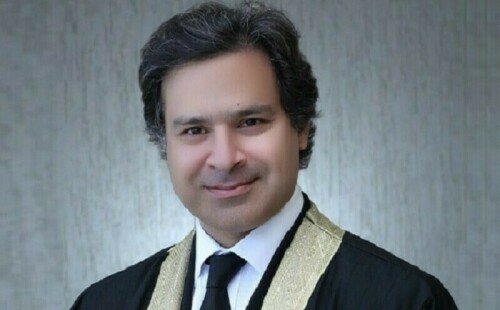ISLAMABAD: The government has allowed convicted Indian spy Kulbhushan Jadhav to meet his mother, his wife and a diplomat from his country on Dec 25, said Foreign Office spokesperson Dr Muhammad Faisal at a media briefing on Friday.
“Pakistan has informed India that it is ready to allow the visit of the mother of Commander Jadhav, along with his wife. The visit should happen on Dec 25, 2017,” he said.
“A diplomat from the Indian High Commission in Islamabad will be allowed to accompany the visitors. Requisite security will be provided to the visitors,” he added.
The decision to allow Jadhav to meet his relatives was taken at a meeting chaired by Prime Minister Shahid Khaqan Abbasi for finalising the counter-memorial to be filed by the government with the International Court of Justice (ICJ) at The Hague in a case in which India has challenged Pakistani refusal to grant consular access to the convicted spy.
Indian contention is that by denying consular access, Pakistan has violated Article 36 of the Vienna Convention on Consular Relations.
The counter-memorial has to be filed on Wednesday (Dec 13).
The government had initially offered a meeting between Jadhav and his wife on humanitarian grounds and in accordance with “Islamic traditions and jurisprudence”. However, India in its response conditioned the acceptance of the offer to permission for his mother and a diplomat from the Indian High Commission to also meet the spy.
Spokesperson says Indian diplomat to accompany visitors
Jadhav has been sentenced to death by a military tribunal for his involvement in espionage and terrorism and the appeal against the sentence has been rejected by a military appellate court. His mercy petition filed with Army Chief Gen Qamar Bajwa is awaiting a decision.
The government’s move to allow the spy to meet his wife, mother and a diplomat, according to analysts, is aimed at strengthening Pakistan’s arguments in the case.
It is believed that by allowing an Indian diplomat to meet Jadhav the government has effectively fulfilled the requirement for consular access. However, it is feared that the move may not be enough to satisfy the court that earlier restrained Pakistan from executing the spy till a verdict is announced by it.
“India took the case to ICJ on the grounds that consular access was not being given, but later expanded its ambit to include trial by a military court and death penalty as well,” the expert said.
Besides, Dr Faisal confirmed that Foreign Minister Khawaja Asif had last month written to his Indian counterpart Sushma Swaraj about ceasefire violations along the Line of Control (LoC) and Working Boundary (WB) by India.
In his letter, the minister had called for political intervention for de-escalating tensions on the LoC which are causing deaths. His contention was that since the agreed mechanisms of DGMOs’ (director generals of military operations) hotline and border meetings were not working, the situation warranted a political initiative for restoring peace along the LoC and WB.
India is said to have breached the ceasefire on more than 1,300 occasions this year and 52 civilians have lost their lives, while 175 have been injured.
Rejecting Indian claims of hundreds of violations by Pakistani troops, the spokesman said: “Paradoxically, when we stress the need for UNMOGIP to be allowed to function with full freedom [on the Indian side where its movement is very limited], to monitor the ceasefire violations at the LoC and Working Boundary, in accordance with the UN Security Council resolutions, India limits its movement and provides limited access.”
Dr Faisal said Foreign Minister Asif’s letter was proof of Pakistan’s desire for a peaceful neighbourhood.
Jerusalem
Repeating its condemnation of the US decision to recognise Jerusalem as Israel’s capital, the spokesman said the move altered the legal and historical status of the city, violated international law and UN Security Council Resolutions, particularly UNSCR 478 of 1980, sidestepped decades of global consensus on this issue, undermined regional peace and security, and derailed any prospects for a lasting peace in the Middle East.
“Pakistan renews its call for establishment of a viable, independent and contiguous State of Palestine, on the basis of internationally agreed parameters, the pre-1967 borders, and with Al Quds Al Sharif as its capital,” he said while reiterating the government’s longstanding position on the issue.
Published in Dawn, December 9th, 2017














































Dear visitor, the comments section is undergoing an overhaul and will return soon.